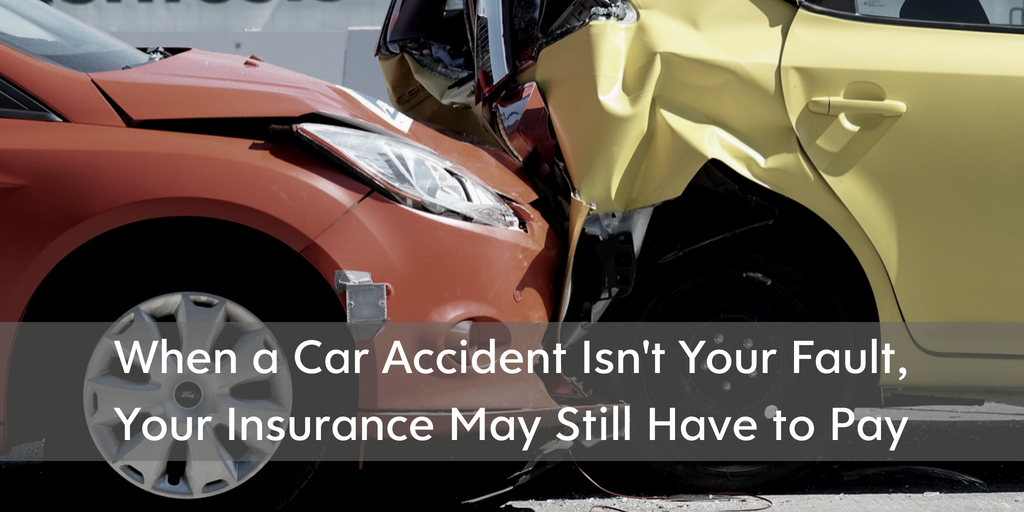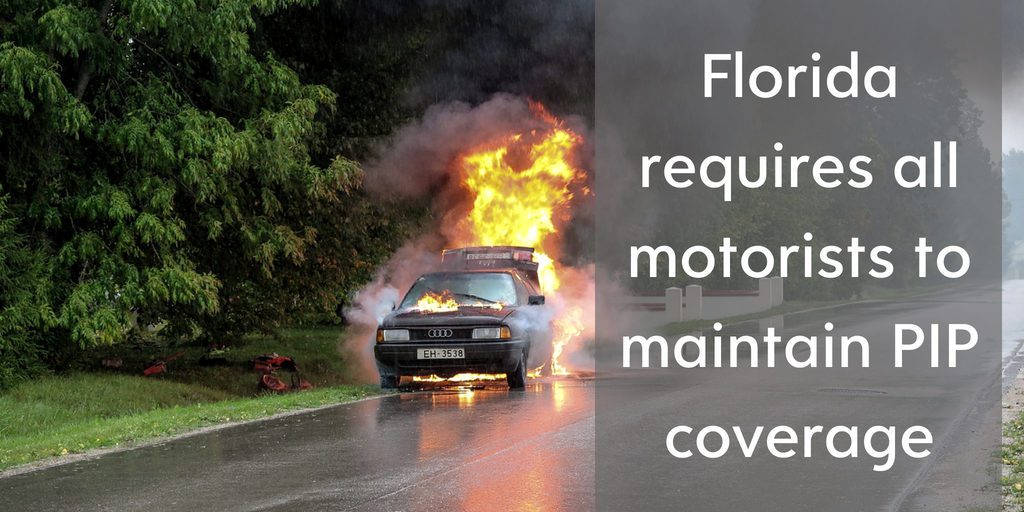
Oftentimes, when I ask my clients what type of insurance policy they have, they say, “full coverage.” This is troubling for a variety of reasons.
First, “full coverage” is not a legal term within Florida. Second, because “full coverage” sounds good, people often have a false sense of security about their coverage and really don’t know what they are paying for with their hard-earned money. This article is written to help you understand your options, your level of protection and what you are buying with your cash, so you can properly protect yourself.
In Florida, there are four types of automobile insurance that may cover you even if the at-fault does not have insurance, or does not have enough, to cover your loss:
- Florida Vehicle No-Fault Law or Personal Injury Protection (PIP)
- Underinsured Uninsured Motorist Coverage (UM)
- Medical Payments Coverage
- Comprehensive Coverage for Property Damage Only
Florida Vehicle No-Fault Law or Personal Injury Protection (PIP)
PIP coverage is governed by Florida Statutes Sections 627.730-627.7405 and is known collectively as the “Florida Motor Vehicle No-Fault Law.”
The stated purpose of PIP is to provide for medical, surgical, funeral, and disability insurance expenses quickly, regardless of fault. Florida requires every vehicle owner to maintain this type of coverage for motor vehicles with four or more wheels required to be registered in Florida.

PIP coverage is required to provide personal injury protection to the named insured (the person who bought the policy), their relatives that live in the same household, anyone they loan their vehicle to, any passengers in the motor vehicle who do not benefit from their own PIP coverage, and other persons struck by the motor vehicle and suffering bodily injury while not an occupant of a self-propelled vehicle with four or more wheels.
PIP is required to cover medical expenses for bodily injury, sickness, disease, or death arising out of the ownership. PIP covers maintenance, at 80 percent up to $10,000 with a $1,000 copayment for qualifying injuries and $5,000 in death benefits. PIP also covers 60% of lost wages due to injury but is still subject to the maximum benefits of $10,000.00.
To qualify for the full $10,000 in medical coverage, a claimant must receive initial medical services and care within 14 days after the motor vehicle accident and be certified to have an emergency medical condition resulting from the accident. Failure to obtain treatment within 14 days waives the right to these benefits. Failure to be diagnosed with an emergency medical condition limits a claimant to only $2,500 in benefits.
The medical benefits provide reimbursement exclusively for the following: chiropractic care, EMS transport, hospital car, dental care, treatment provided by an advanced registered nurse practitioner and physical therapy.
While standard PIP has a $1,000 deductible, insurers are required to offer lesser deductible options, for an additional premium, in amounts of $250, $500, and $1,000. The deductible amount must be applied to 100 percent of the medical expenses.
Underinsured Uninsured Motorist Coverage (UM)
Uninsured and underinsured motorist benefits are probably the single most important type of coverage a person can purchase to protect themselves and their families. UM is a voluntary coverage unlike PIP. You are not forced by the state government to purchase this type of coverage. UM protects you and your family against a negligent driver who either illegally does not have liability coverage, or has coverage that is inadequate to fully compensate you or your family for injuries caused by the accident.
If you get injured by an uninsured driver’s negligence, you would be able to make a claim for you or your loved ones under your own uninsured motorist coverage. This type of coverage will even follow you and your resident family members when you are passengers in someone else’s vehicle if it is involved in an accident.
Like all insurance policies, as long as the insurance company does the right thing by honoring the terms of the contract with the insured, you will only be able to collect up to the policy limits that you purchase. Therefore, our firm recommends that you purchase as much UM coverage as you can, but at a minimum, no less than two years’ worth of income, because if you get a career ending injury, it usually takes about two years to get approved for Social Security Disability.

How UM works is if the at-fault party doesn’t have any or enough liability insurance, your UM policy is required to pay the additional amount necessary up to the policy limits that you purchased to fairly compensate you for your injuries. The term “fairly” is usually where most people have a disagreement with their insurance provider. You simply would not believe how little automobile insurance companies believe their insured’s pain is worth! This is why it is very important to make sure you get an attorney who understands how different insurance policies interact and is also knowledgeable regarding the nature of accident-related injuries.
Medical Payments Coverage
Medical payment coverage is self-explanatory. It covers medical expenses from a motor vehicle accident. What the insurance companies don’t tell you is that if you get a recovery for your injury from a third party you will have to pay back the monies paid by Medical Payments coverage. This type of coverage is only really appropriate if you have a high-deductible PIP policy, no health insurance or high-deductible health insurance. If you have zero-deductible PIP and health insurance, this coverage would actually lower your potential recovery.
Comprehensive Coverage
Comprehensive Coverage covers your property only. It covers it for damage resulting from an accident regardless of fault and from vandalism. The only key point to this insurance is to find out what is covered before you buy. Some include coverage for the contents of your car, like your iPod, Iphone, Ipad, laptop, purse, full gas tank, firearm,etc. Many others do not cover content and only cover the vehicle itself. Some Comprehensive Coverage policies include a rental car provision while your car is getting repaired. All have a maximum that they will pay per day and time restrictions. Don’t be surprised if your Mercedes SUV gets damaged that you end up driving the smallest, cheapest vehicle from the cheapest rental car place. You may have to cover the amount your insurance does not cover.
The way to avoid this is to know what you’re buying before you buy the policy. Ask if contents are covered and ask what the maximum coverage is for your contents. If your car is stolen, will they really cover the $3,000 laptop you had in the trunk? Will they cover the engagement ring that you took off while working out that was stolen during a break-in? Ask what the rental allowance is. Ask what the deductible is if the accident is your fault. Ask what it is if it’s the other guy’s fault. What is it if a tree branch falls on your car? What is it if someone steals your car? Ask whether they pay replacement value or market value if your car is totaled. Replacement is what it actually takes to get you another car comparable to your old one. Market value? That’s often much less.
Conclusion
Not knowing the answers to these questions can lead to a huge disappointment after you’ve already had a very bad day. So, plan ahead. Find out what you’re buying. Find out your actual coverage values.













